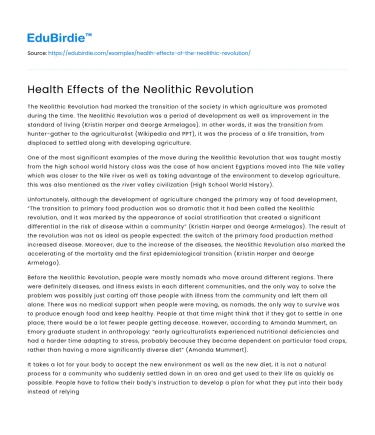The Neolithic Revolution had marked the transition of the society in which agriculture was promoted during the time. The Neolithic Revolution was a period of development as well as improvement in the standard of living (Kristin Harper and George Armelagos). In other words, it was the transition from hunter-gather to the agriculturalist (Wikipedia and PPT), it was the process of a life transition, from displaced to settled along with developing agriculture.
One of the most significant examples of the move during the Neolithic Revolution that was taught mostly from the high school world history class was the case of how ancient Egyptians moved into The Nile valley which was closer to the Nile river as well as taking advantage of the environment to develop agriculture, this was also mentioned as the river valley civilization (High School World History).
Save your time!
We can take care of your essay
- Proper editing and formatting
- Free revision, title page, and bibliography
- Flexible prices and money-back guarantee
Unfortunately, although the development of agriculture changed the primary way of food development, “The transition to primary food production was so dramatic that it had been called the Neolithic revolution, and it was marked by the appearance of social stratification that created a significant differential in the risk of disease within a community” (Kristin Harper and George Armelagos). The result of the revolution was not as ideal as people expected: the switch of the primary food production method increased disease. Moreover, due to the increase of the diseases, the Neolithic Revolution also marked the accelerating of the mortality and the first epidemiological transition (Kristin Harper and George Armelago).
Before the Neolithic Revolution, people were mostly nomads who move around different regions. There were definitely diseases, and illness exists in each different communities, and the only way to solve the problem was possibly just carting off those people with illness from the community and left them all alone. There was no medical support when people were moving, as nomads, the only way to survive was to produce enough food and keep healthy. People at that time might think that if they got to settle in one place, there would be a lot fewer people getting decease. However, according to Amanda Mummert, an Emory graduate student in anthropology: “early agriculturalists experienced nutritional deficiencies and had a harder time adapting to stress, probably because they became dependent on particular food crops, rather than having a more significantly diverse diet” (Amanda Mummert).
It takes a lot for your body to accept the new environment as well as the new diet, it is not a natural process for a community who suddenly settled down in an area and get used to their life as quickly as possible. People have to follow their body’s instruction to develop a plan for what they put into their body instead of relying on the rapid development of agriculture.






 Stuck on your essay?
Stuck on your essay?

